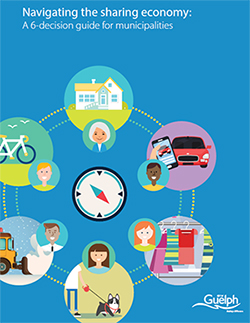On this page
Navigating the sharing economy
A 6-decision guide for municipalities

Sharing is one of the oldest and most universal instincts. Disruptive digital technologies make sharing easier than ever by facilitating peer-to-peer relationships and enabling people to connect with one another directly and more equitably. Today citizens can share on a large scale and with strangers, not just with friends, family and their direct communities.While this “sharing economy” can create many benefits, it also raises a number of questions, from the impact on tax bases to safety and liability concerns.
Many of these issues fall within the purview of municipal government. As a result, sharing economy initiatives are being shaped by zoning codes, hotel and taxi licensing regulations, transit and all manner of distinctly local policy.
This Guide is designed to help municipalities understand this new economy, what it means on a local level and how to respond appropriately. As they navigate this new terrain, municipalities should keep three points in mind.
- The sharing economy encompasses a wide range of models and sectors.
- There is currently a lack of data on the impacts of the sharing economy, especially outside of large cities, but the data that does exist points to both positive and negative impacts.
- Municipalities have a range of options available to shape the local sharing economy.
Different models of sharing necessitate different responses, and local governments can opt to play a number of different roles depending on their policy objectives.
As the sharing economy grows, municipalities need to determine how they will respond. This Guide does not attempt to recommend any particular approach. Each municipality will need to craft their own approach based on their goals and local context.
This Guide provides a brief introduction to the sharing economy and then identifies the following six decisions to guide municipalities that are anticipating or reacting to a shared economy platform in their jurisdiction.
- What type of approach is most appropriate?
- What are the primary public policy goals?
- What type(s) of sharing will be included?
- What kinds of policy actions or tools are needed?
- Design considerations
- Implementation and evaluation
Reaching these decisions is not a linear process, and there is no particular, prescribed order in which to make them.
Staff and students from the University of Guelph worked closely with staff at the City of Guelph to produce ‘Navigating the Sharing Economy.’ Through the Guelph Lab – a partnership between the City of Guelph and the University of Guelph – students provided extensive research, conducting interviews with city staff and other experts, producing a list of resources, and preparing a scan of existing examples of municipal responses to the sharing economy. The Lab produced the first draft of the report, and is pilot testing it as part of Guelph’s vehicle-for-hire bylaw review process.

The Guide includes case study examples to illustrate different ways municipalities have answered these questions, along with links to further reading materials, resources and cases.
Compendium of resources
This is a collection of resources related to the sharing economy. The list was gathered as part of research for “Navigating the sharing economy: A six-decision guide for municipalities.” The list includes case studies of many less well known forms of sharing, as well as resources on community-based / mission-driven models of sharing (e.g., platform co-operatives). There are also articles dealing with the different debates about the sharing economy, including articles that critique some forms of sharing.
Please note: this not an exhaustive list – there are opinions, points of view and cases not represented here. All links were correct at time of use (August 2017).
For more information
Cathy Kennedy
Manager, Policy and Intergovernmental Relations
Office of the Chief Administrative Officer
519-822-1260 extension 2255
[email protected]
